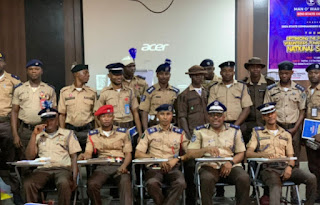Connected Advocacy hold round table meeting on community ownership, installs new patron
By Isaac Eranga
Chief Uba A. MichaelBenin City: In a bid to fostering sustainability of community interventions after expiration of donors'support, Connected Advocacy recently held a community stakeholder roundtable in Benin City. The roundtable was meant to establish a sustainability model that will help sustain donor sponsored interventions and projects.
The roundtable also featured the installation of a new patron for Connected Advocacy. He is Chief Uba A. Michael- Chairman of Ubacle Group. Chief Uba Michael is a civil and environmental activist that is reputable in interfacing between civil societies and other state actors. As a humanitarian, Chief Uba has over the years partnered with several NGOs in coming up with different empowerment scheme geared towards promoting financial independence amongst youth and women.
Mrs Ronke Ojiekere (1st from right) board member- Connected Advocacy, Prince Israel Orekha (2nd from right) Executive Director- Connected Advocacy, Chief Uba A. Michael (2nd from left), and Mrs. Uba (1st from left), during official presentation of Connected Advocacy branded Tee-shirt to Chief Uba MichaelIn his acceptance speech, Chief Uba thanked Connected Advocacy for for recognising his effort in promoting financial independence amongst youth and women and other marginalized groups in the society. He said community ownership of donor sponsored interventions is very imperative because it helps in the sustainance of the interventions when such sponsorship expires.
According to him, "There are several times where projects end whenever donor funds end, thereby abandoning the projects. But with community ownership, sustainability will be guaranteed.
"Community ownership encourages responsibility and accountability among the community people. It promotes co-operation, coordination and collaboration between the stakeholders and the community people.
"Community ownership also raises community leadership and empowerment, thereby promoting new ideas and strategies through the bottom- up approach. It also responds to the needs of people of respective communities and increases community participation", Chief Uba said.
Speaking earlier, the Executive Director of Connected Advocacy, Prince Israel Orekha said Connected Advocacy has been in the forefront of advocating for youth and marginalized groups inclusion in achieving open governance partnership. He said community ownership is the act or degree of ownership and responsibility taken by the community towards any programs or activities running in the Community.
"The question to ask at this juncture, is how can we ensure Community Ownership during the planning and implementation of programs? This question is very important for us to answer because as we speak, donors are living Edo State because of the government's inability to pay counterpart fund. If these donors leaves, of which, some have left, are we going to abandon the projects already started? Ensuring community ownership during planning and implementation of programme stages, the problem of sustainability would be minimized.
"We can ensure community ownership during planning and implementation of the program through following approaches: involving community people/community leaders from the idea generation and planning phase of the program; identifying the felt need and real need of the community and acting accordingly; appreciating and prioritising community culture, values and beliefs; conducting regular stakeholders meeting and discussions; giving leadership roles to the community people; mobilizing local resources for the program; encouraging community people to actively participate in monitoring and evaluation of the programs; etc.
"If community ownership is put in place, the following benefits will be achieved: economic benefits/ financial sustainability of the programs; providing physical base for provision of services; increase in public acceptability; empowerment of local community; sustainability of the programs; active community participation, engagement and mobilization at all levels of program implementation; capacity building/skill enhancement of community people; better stewardship towards local assets increase in pride and confidence among community people; strong government support; community ownership also promotes leadership and democratic decision, etc", said Prince Orekha.
Prince Orekha however posited the following as challenges usually encounter while ensuring community ownership of interventions or projects: level of involvement of community people; limited community participation; lack of trust to external agents by the community people; unavailability of resources; conflicts between different stakeholders of the community; ineffective leadership; limited time; socio-cultural barriers; lack of clear authority and responsibility among the community people; ensuring unity of command; maintaining and fostering equity; etc.






Comments